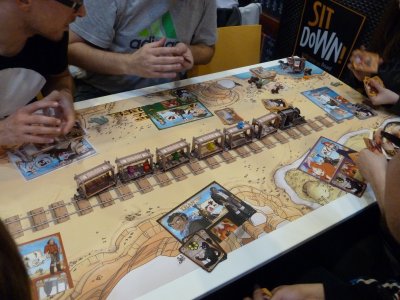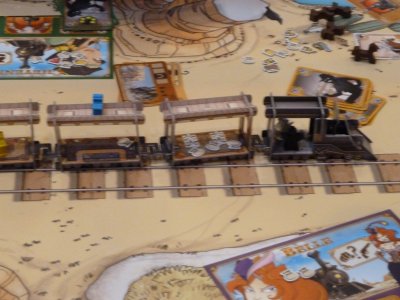

![[IMAGE]](../bilder/coltex1.jpg) |
Designer: Publisher: No. of Players: Awards: |
![[IMAGE]](../technik/box/rot/rot-4.gif) ![[IMAGE]](../technik/box/gelb/gelb-9.gif) ![[IMAGE]](../technik/box/grun/grun-9.gif) ![[IMAGE]](../technik/box/pink/pink-5.gif) ![[IMAGE]](../technik/box/blau/blau-9.gif) |
|
A game about a Wild West Train Robbery? Now, that's a fresh theme indeed! Two to six players can participate in this holdup gone boardgame, but whereas the two-player variant sees each player taking control of a team of two outlaws in a more strategically orientated game, games with five or six players will follow a slightly more unpredictable but entertaining "the more, the merrier" approach. So, the players start with their outlaw figures being positioned in one of the last carriages of the train, and during the game they will try to move through the train, trying to collect valuables like purses, jewelry and rather valuable strongboxes.
 Each player possesses an identical deck of 10 Action cards which he will shuffle at the beginning of a round, and from the shuffled deck each player will draw a hand of six cards which he may now use to plan his actions. Unlike Roborally where always a total of 5 programming cards is placed face-down in front of the players, Colt Express uses a deck of randomly drawn Round cards to determine how many Action cards each player will be allowed to play during a round. In addition, the Action cards will be played one at a time in player order, and all cards will be combined in a face-up deck which is turned face-down once the programming phase of a round has been finished. Then the cards will be revealed one at a time, allowing the player who has played the revealed card to perform the corresponding action. The choice of available actions ranges from collecting valuables in the carriages, moving from one carriage to the next or climbing on top of the train to more nasty tricks like the movement of a Marshal or hitting/shooting at opposing characters. The valuables need to be collected in order to win the game since the player with the biggest loot after 5 rounds of play will be declared winner, but shooting at another character or sending the Marshal to catch someone will result in the assignment of Bullet-cards. So, if a player's character is shot at, he will be assigned a Bullet-card (either from the firing player or from the neutral Marshal-deck), and these Bullet-cards will be added to the victim's deck of Action cards. During the course of the game the player now may find Bullet-cards whenever he draws cards from his Action deck (either at the beginning of a round or when he spends an action to draw additional cards), and these cards are troublesome in so far as they just clog up the player's Action deck without any further use. So, the more Bullets a deck contains, the higher the chance to find Bullets instead of normal Action cards, and this may result in a player having a smaller choice of available actions.  To offer a versatile playing experience, the Round cards do not only specify how many Action cards will be played each round, but instead they may also bring along events like a tunnel which may result in the face-down playing of Action cards or an uproar among the train's passengers, resulting in every outlaw in the train being assigned a Bullet card. Additional spice and variety is added by the fact that each outlaw has a special ability which may prove helpful when performing the one or other action, and taken together all these elements make up a quite entertaining gameplay with many funny, unexpected turns. Unlike other programming-games, the players usually will reveal their Action cards when they place them into the common Action deck. This open placement procedure gives all players some ideas on the course of action chosen by their competitors, but it is nonetheless a rather interesting challenge to try to gain an advantage out of this knowledge. Some unexpected turn of events may be triggered by many situations, for example if one player uses a "Punch" Action card on another outlaw in the same carriage. The victim of the blow does not only lose something valuable, but he will also be relocated into a neighboring carriage, and since all victims are chosen only when programming has finished and the card appears in the common deck, actions like this may have a great impact on another player's planned course of action. It is exactly due to the frequency of possible interruptions that the programming mechanism is much less strategic in Colt Express in comparison to other games like Roborally. At this point it should be kept in mind that Colt Express has won the "traditional" Spiel des Jahres awards which always was meant to distinguish the best "family game". If taken for its interesting but not overburdened playing mechanism, the catchy theme and the high entertainment value, the game excels all expectations and guarantees hours of playing fun. In addition, our gaming groups often are attended by a total of six players, but since many light strategy games are limited to a cast of five, Colt Express is one of the more rare gems which can be played rather well with 5 or 6 players. With all these elements falling in place, I fail to see any contestant which may have beaten Colt Express for the family version of the Spiel des Jahres awards in 2015. | ||
|
| ||

|
|

|
|
| ||
|
Impressum / Contact Info / Disclaimer Kulkmann@aol.com
Copyright & copy; 2015 Frank Schulte-Kulkmann, Essen, Germany | ||